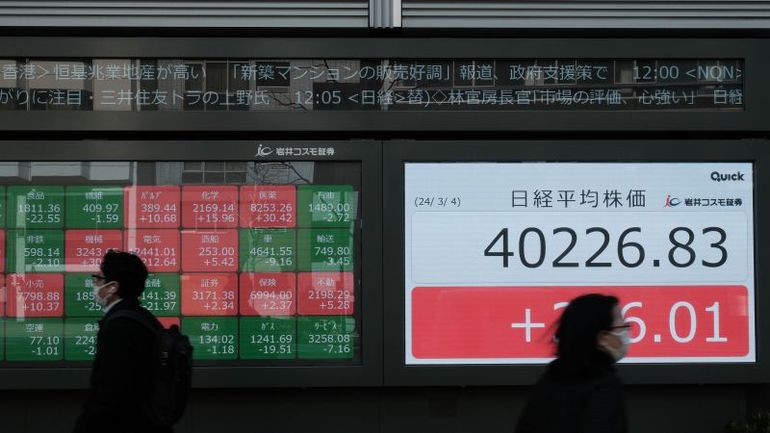
Asian Markets Soar as Japan's Nikkei 225 Hits Historic 40,000 Mark Amid China's GDP Target Announcement

The Asian Markets are buzzing with excitement as Japan's Nikkei 225 reaches an unprecedented milestone of 40,000 for the first time. Meanwhile, China prepares to unveil its GDP target, setting the stage for a dynamic week ahead.
Asian Markets have started the week on an upbeat note.
Japan’s Nikkei 225 index jumped above 40,000 for the first time on Monday, extending a historic rally that analysts say has just begun.
The Nikkei index reached a new milestone just days after hitting a record high of 39,098.68, surpassing its previous peak from 1989.
On Monday, the Nikkei index increased by 0.5% and has been performing exceptionally well for over a year. This growth can be attributed to strong corporate earnings, a favorable exchange rate benefiting exporters due to a weaker yen, and an increase in foreign investors seeking opportunities outside of China's struggling markets.
Jefferies analysts stated in a recent research report that Japan is anticipated to be one of the top performing markets from 2023 to 2030. They also mentioned that the shareholder return story in Japan has started to unfold.
This year, the Nikkei has experienced a remarkable surge of over 20%, establishing itself as the top performer among major equity indexes globally.
Monday's rally was a result of the recent surge in US stocks towards the end of last week. Both the Nasdaq and the S&P 500 reached new record highs on Friday, driven by the rise in chipmakers and artificial intelligence stocks.
The positive outlook on semiconductors also had a positive impact on Taiwan's stock market. The benchmark Taiex reached an all-time high on Monday, with Taiwan Semiconductor Manufacturing Company leading the way.
The largest contract chipmaker in the world saw a 5.2% increase in its stock value, thanks to being the primary manufacturer of AI chips for companies like Nvidia.
In other parts of the region, South Korea's Kospi rose by 1.2%, but Hong Kong's Hang Seng experienced a slight decrease of 0.5%.
Mainland Chinese stocks are trading slightly higher as investors keep an eye on the upcoming annual meeting of the National People’s Congress (NPC). The NPC is the country’s legislative body and will bring together around 3,000 delegates in Beijing for the next week.
Premier Li Qiang will announce China’s growth target for 2024 on Tuesday. He is also expected to introduce additional stimulus measures to boost the struggling economy.
The Shanghai Composite Index saw a 0.3% increase.
Stephen Innes, managing partner at SPI Asset Management, emphasized the importance of the NPC meeting for the future of assets in China for 2024 and beyond.
He mentioned that the announcements and policies revealed during the parliamentary session will offer valuable information on China's economic priorities, strategies, and possible market changes. This will influence investor sentiment and asset allocation decisions both in China and worldwide.
Chinese policymakers are currently dealing with various challenges in order to improve the economy. These challenges include stabilizing the property sector, addressing deflationary pressures, reversing foreign capital outflows, and revitalizing the struggling stock market.
Many analysts predict that the policymakers will aim for a growth target of approximately 5% for this year.
The Communist Party's Politburo, the top decision-making body, recently vowed to achieve the economic growth goals for 2024. They plan to do this by encouraging domestic demand and supporting the development of technology and innovative industries.
China's economy grew by 5.2% in 2023, meeting the official target set for that year.
Editor's P/S:
The surge in Asian markets, particularly Japan's Nikkei 225 index, is a testament to the region's economic resilience and the growing attractiveness of Asian equities. The positive outlook for Japan, as highlighted by Jefferies analysts, suggests that the country is poised for continued growth in the coming years. The strong performance of Taiwan's stock market, driven by the rise of chipmakers, further underscores the region's technological prowess.
However, the slight decrease in Hong Kong's Hang Seng index and the upcoming NPC meeting in China introduce a note of caution. The NPC meeting will provide insights into China's economic priorities and policies, which will impact investor sentiment and asset allocation decisions both in China and worldwide. The challenges facing Chinese policymakers, such as stabilizing the property sector and addressing deflationary pressures, will need to be carefully managed to ensure sustainable growth.








